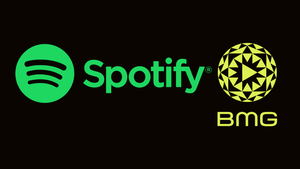BMG is the latest music publisher to agree a direct licensing deal with Spotify covering the streaming of its Anglo-American repertoire in the US market, and circumventing the compulsory licence administered by collecting society The MLC.
The new deal, an official announcement declares, “reflects BMG and Spotify’s shared interest in building a direct relationship that ensures songwriters share more directly in the value created by their work”. Which sounds lovely. It’s always nice to have shared interests, after all.
Of course BMG, like the majors and Kobalt before it, entered into direct licensing talks with Spotify after the streaming service started exploiting a loophole in the compulsory licence to significantly reduce what it pays to songwriters and music publishers via The MLC.
BMG definitely had an interest in reducing the impact of Spotify exploiting that loophole, while Spotify had an interest in using that fact to get some extra benefits out of the music publisher. Somewhere in the middle of all that, some shared interests were identified.
“At Spotify, we believe the future of music depends on stronger collaboration across the industry”, says Alex Norström, Co-President and soon to be Co-CEO at Spotify. “Our partnership with BMG advances that vision with renewed support for songwriters through a licensing model that will enhance how music is enjoyed on our platform”.
BMG boss Thomas Coesfeld says he’s pleased to have agreed a “progressive licensing model” with Spotify, which “reflects the real-world use of music across digital platforms”, and he is “excited to take our partnership to the next level as we continue to redefine what a modern music company can be”.
Music publishers like Sony Music Publishing, Universal Music Publishing, Warner Chappell, Kobalt and BMG have long had direct licensing relationships with streaming services like Spotify in Europe and many other markets around the world. However, in the US, since the creation of The MLC in 2021, the mechanical rights in songs have generally been licensed via the compulsory licence, while the separate performing rights are licensed through other collecting societies like BMI and ASCAP.
But the MLC administered compulsory licence includes a bundling discount that allows a streaming service that bundles music with other content to reduce what it pays to songwriters and publishers.
In 2023, Spotify started including audiobook access within its main premium subscription package and then, the following year, started applying the bundling discount to its royalty payments, much to the outage of writers and publishers.
The MLC sued Spotify, arguing it was incorrectly applying the discount. That lawsuit was initially dismissed by the courts, but was reinstated last month.
Publishers can’t opt-out of the compulsory licence, meaning Spotify can rely on it if necessary. However, some of the ways Spotify is evolving its service are not covered by that licence, allowing the bigger publishers to pressure the streaming service to the negotiating table, seeking a bespoke deal around its core use of music in addition to providing the permissions necessary for different product innovations.
That said, the MLC’s lawsuit - and the impact it may have on the compulsory licence within the US - remains important, because lots of smaller indie publishers, not to mention self-published writers, are still being paid via the MLC.

